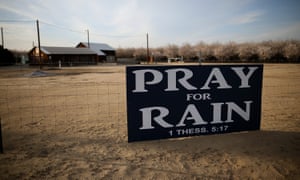Extract from The Guardian
In the third part of our series looking at the climate report Trump
tried to bury over Thanksgiving, we look at its alarming projections for
our water supplies
The Trump administration published a major report on climate change the day after Thanksgiving. We will explore the key findings each day this week.
Donald Trump doesn’t believe his own government’s major report on climate change – which the administration tried to bury over the Thanksgiving break. It warns that rising temperatures are already harming America and will cause huge damage globally.
Donald Trump doesn’t believe his own government’s major report on climate change – which the administration tried to bury over the Thanksgiving break. It warns that rising temperatures are already harming America and will cause huge damage globally.
Critical water supplies will become harder to maintain
Water will become increasingly difficult to manage in the face of climate change. Government planners are already having a harder time supplying clean water to America’s general population, farmers and ecosystems, as aquifers are being depleted in many regions of the US.And with climate change and rising temperatures, they will be battling an even deeper worsening of droughts and more flooding from intense rainfall events.
Those pendulum swings could become the normal situation, and water-related disaster events are already costing the US hundreds of billions of dollars a year in damages.
Warmer water will also harm ecosystems and there could be more problems from pollutant runoff into water bodies that are used as human water supplies. Harmful algal blooms, like one that shut down the water supply in Toledo, Ohio, could increase as the warm season lengthens. On the coasts, salt water will increasingly intrude into coastal rivers and aquifers as sea levels rise.
Additionally, public water systems are ageing and will have trouble keeping up with climate change, requiring massive investments.
“A central challenge to water planning and management is learning to plan for plausible future climate conditions that are wider in range than those experienced in the past,” the report says, noting that the challenge is both scientific and political, requiring new approaches and changes to regulatory and legal structures.

No comments:
Post a Comment